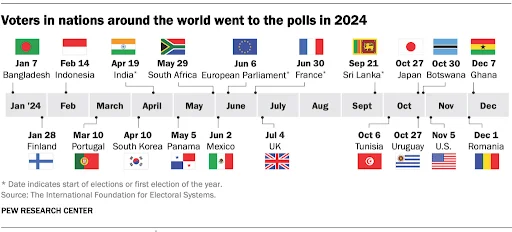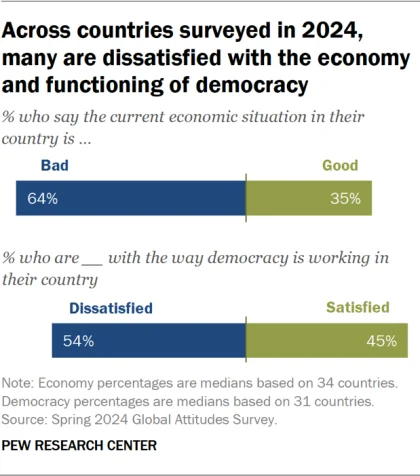Introduction
- The year 2024 saw elections across various nations, including India, showcasing the vibrancy of democracy. Yet, despite the surge in electoral activity, global surveys have highlighted an alarming trend.
- According to Pew Research, 54% of adults in 31 countries expressed dissatisfaction with how democracy functions in their respective nations.
- Many reported feeling disconnected from political leaders and institutions, and believed that political parties no longer represented their interests.
- This widening disconnect has led to a steady decline in voter participation, raising concerns about the future of democracy.

Key Challenges Impacting Democracy
- Rise of Authoritarianism: In 2024, many established democracies saw a rise in authoritarian tendencies. Leaders increasingly leveraged crises, such as economic challenges and geopolitical tensions, to consolidate power. In countries like Hungary and Turkey, for example, leaders used national security concerns and economic instability to push through laws that erode democratic checks and balances, including limiting judicial independence and curbing press freedom. This trend threatens the very foundations of democratic governance, as reported in the World Democracy Report 2024.
- Weakening of Core Democratic Values: Core democratic values such as freedom of expression, rule of law, and individual rights faced growing threats in 2024. In the Philippines, for instance, President Duterte’s successor continued policies that undermined civil liberties, with increased attacks on journalists and opposition figures.
- Declining Democratic Quality: The Global State of Democracy Report 2024 reveals several setbacks within democratic frameworks worldwide. These include a decline in credible elections, ineffective parliamentary systems, worsening economic inequality, and restrictions on freedoms of expression and the press. notable example of this decline is Brazil’s 2024 elections, where there was widespread concern over misinformation campaigns and suppression of opposition voices.
- Erosion of Public Discourse: One of the most striking challenges in recent elections has been the decline in civility within public discourse. Campaigns have increasingly relied on divisive language and rhetoric, undermining meaningful political dialogue. The result is a more polarized society, where political debate is often centered on personal attacks rather than constructive solutions to national issues. This trend is extensively documented in the World Economic Forum (WEF) 2024 reports on global elections and the quality of public discourse.
Read also: The All India Household Consumption Expenditure Survey 2023-24 | UPSC
- Misinformation and Polarization: Misinformation has emerged as a critical threat to democratic elections. The World Economic Forum (WEF) has noted that misinformation significantly affects voter perception, skewing electoral outcomes and deepening societal divisions. This unchecked spread of false information jeopardizes electoral integrity, making it harder for voters to make informed decisions.
- Voter Discontent: A widespread sense of dissatisfaction with democratic systems is evident across multiple countries. WEF surveys reveal that more than half of the population in 31 nations feels disconnected from political leaders and institutions. In countries like France and South Africa, many citizens believed that elections no longer resulted in meaningful change, contributing to voter apathy. This was highlighted in the World Democracy Report 2024, which noted increasing frustration with the political process and declining trust in democratic institutions.
- Erosion of Trust in Institutions: Among younger demographics, there is growing disillusionment with democratic institutions. In Brazil and India, for instance, young voters felt that elections offered no real improvement to the socio-economic challenges they faced. The Global State of Democracy Report 2024 found that younger voters are increasingly disengaging from the political process, believing that their votes do not lead to tangible improvements in issues such as employment, education, and climate change.
- External Interference in Elections: External interference in democratic processes has become a pressing issue in 2024. Reports from the World Economic Forum and various national intelligence agencies highlighted several instances of cyberattacks aimed at manipulating public opinion in countries such as the U.S. and the UK. Foreign actors used social media platforms to spread divisive messages, complicating efforts to preserve the integrity of democratic elections. This external interference has raised alarms about the vulnerability of democratic systems in the face of global cyber threats.
- Economic Instability: Economic instability, exacerbated by factors like climate change and geopolitical tensions, contributed to dissatisfaction with democratic systems. In 2024, many voters, particularly in the U.S., Brazil, and parts of Europe, turned to populist and extremist parties offering quick fixes to deep-rooted economic problems. These parties gained traction by capitalizing on the financial hardships caused by inflation and unemployment, promising simple solutions to complex issues. The World Economic Forum 2024 report discusses how economic instability is often used by populist parties to gain political capital by making unrealistic promises.

Reasons for Declining Voter Participation
- Voter Fatigue: One of the major contributors to declining voter participation is voter fatigue. The frequency of elections, coupled with constant political campaigning, leads to voter burnout. In countries like the United States, where there are elections every two years for various offices (from local to federal), citizens often feel overwhelmed by the relentless nature of the electoral cycle. For example, in the 2024 U.S. elections, voter turnout in midterm elections was lower than in presidential election years, partly due to the overwhelming amount of campaigning and political ads.
- Urban Apathy: In urban areas, a sense of disconnection from the political system often leads to voter apathy. Many urban dwellers feel that their concerns are not represented by political leaders, causing them to disengage from the voting process altogether. This trend is noted in the 2024 India Election Analysis published by the Centre for the Study of Developing Societies (CSDS), which found that urban voters often feel disconnected from the political system, contributing to lower turnout.
- Disillusionment with Political Candidates: Voters are increasingly disillusioned with political candidates and their campaigns. When candidates are seen as untrustworthy, corrupt, or out of touch with the electorate’s needs, many people choose not to vote. In Mexico, many voters in the 2024 elections were disillusioned with the candidates from major political parties, viewing them as either corrupt or disconnected from the real needs of the people. This disillusionment was reflected in the Latin American Political Engagement Survey 2024, which showed a significant drop in trust in political candidates.
- Socio-economic Barriers: For individuals from lower socio-economic backgrounds, voting can be a logistical and financial challenge. In South Africa, during the 2024 elections, many voters from poorer communities faced barriers such as long travel distances to polling stations, lack of transport, and financial constraints preventing them from taking time off work. The South African Election Survey 2024 highlighted that these challenges led to significantly lower voter turnout among low-income groups, especially in rural areas.
- Political Polarization and Negative Campaigning: The rise in political polarization and aggressive, negative campaigning has further alienated voters.Iin Turkey, the 2024 elections saw a sharp divide between pro-government and opposition parties, with campaigns focused on vilifying each side rather than offering substantive policy solutions. This was noted in the Turkey Election Report 2024 by the International Foundation for Electoral Systems (IFES), which found that divisive political rhetoric contributed to voter disengagement.
- Unfulfilled Promises: Another significant reason for voter disengagement is the failure of political parties to deliver on their promises. Misgovernance, corruption, and misplaced priorities have resulted in many citizens feeling that elections are a mere formality, with no real change occurring. In the United Kingdom, many voters were disillusioned with the failure to deliver on Brexit promises, as seen in the UK Post-Brexit Political Report 2024. This frustration with unfulfilled promises led to a sense of voter apathy, as citizens felt that the political class failed to address their core concerns.
See more: None of the Above (NOTA): Significance and Challenges | UPSC
Way Forward
- Restriction on Government Advertisements: To ensure fairness in the electoral process, government advertisements that highlight achievements should be prohibited six months before elections. Additionally, cash-based incentive schemes should not be announced during this period, as they may unfairly influence voters.
- Strengthening Election Commissioners’ Independence: The independence of election commissioners should be safeguarded by offering them the same level of protection from arbitrary removal as the Chief Election Commissioner. This reform would ensure that election management bodies remain impartial and free from political interference.
- Anti-Defection Law Reforms: The President or Governor should make decisions regarding anti-defection cases based on the advice of the Election Commission of India (ECI), ensuring impartiality in this vital process.
- Punishing False Declarations: False declarations made during elections should be made a punishable offense, with strict penalties for candidates who mislead voters. This would encourage greater accountability and transparency in the political process.
- One Nation, One Election: To address voter fatigue and streamline the electoral process, implementing synchronized elections across the country, as recommended by the Kovind Panel, could be an effective solution. This approach would reduce the frequency of elections, saving resources and encouraging voter participation by making the process less overwhelming.
- Single Constituency Candidature: Another potential reform would be to prevent candidates from contesting elections in more than one constituency. This would ensure that political campaigns remain focused on local issues, encourage better accountability, and discourage the opportunistic politics often seen in multi-constituency candidacies.
- Ban on Criminals in Politics: A significant step toward decriminalizing politics would be to impose a lifetime ban on individuals convicted of serious crimes from contesting elections. This would help restore trust in the political system and ensure that candidates are held to high ethical standards.

